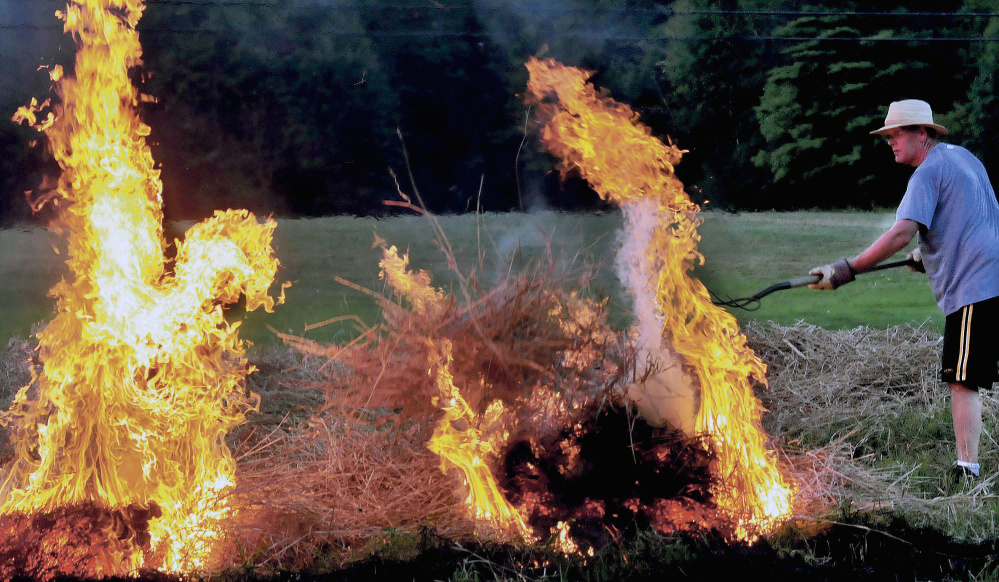The people behind Warden’s Report, a private online issuer of open burn permits, plan to debut a new search feature Monday to make getting permits easier for the state’s residents.
“We have about 70 towns right now,” Gary Hickey II said. “So we’re changing the cover page to break it down by counties so people can (find them that way). And we’ve added every town in the state to make it more convenient for towns to join.”
Even as Hickey is forging ahead with this project, the state Department of Agriculture, Conservation and Forestry continues its resistance to recognizing such systems, even though emergency legislation passed by the Legislature in June makes them legal.
The department’s reluctance is frustrating for Sen. Shenna Bellows, D-Manchester, who worked to pass L.D. 1640 earlier this year.
“The state should not be trying to stop towns from using a system that works,” Bellows said. “It feels like the state is trying to throw up barriers because they want to drive people to the state system, which is unwieldy.”
She said she doesn’t know whether the department doesn’t understand the technology of these online platforms or whether politics are playing a role.
“This was a great example of bipartisan collaboration on an issue that affects everyone that shouldn’t be political or complicated,” she said.
The department sent a letter at the end of August advising cities and towns using private services that the Maine Forest Service is unable to endorse any private system.
“Having no idea of the proliferation or compliance of private online systems resulting from L.D. 1640, the MFS will be unable to endorse such systems,” the letter signed by department Commissioner Walter Whitcomb and Maine Forest Service Director Doug Denico states. “The best and most conservative course for a burn permittee to follow is to use the traditional paper permit system or the MFS online burn permit system.”
No one from the agriculture department was available to be interviewed at the end of last week.
John Bott, the department’s director of communications and special projects, said in an email that because the legislation was done in haste without a public hearing or fire expert testimony, the statue is unclear in several places and that’s why the forest service provided statutory guidance to towns and operators.
“Please note that our Forest Rangers have honored private online permits amidst the confusion,” he wrote. “We just cannot endorse these systems.”
But the two systems issuing the permits, Wardensreport.com and BurningPermit.com, were developed by firefighters in Maine. Hickey, of Warden’s Report, is the West Gardiner fire chief. Matthew Scott, who created his online platform with the help of a software developer, has been a member of the Gorham Fire Department for 25 years.
Hickey said he offered to meet with state officials after the emergency legislation passed into law without the signature of Gov. Paul LePage in July, but he has received only a note that the forest ranger specialist who had been working on the issue was out of state.
“I just want to try to see if we can sit down and see how we can be on the same page and offer a system that works and is convenient for the residents and is free,” he said.
In Maine, anyone burning brush, wood debris, grass or agricultural fields is required to have a permit issued by either the Maine Forest Service or fire wardens in the person’s own city or town. Town-issued paper permits are free. The Maine Forest Service offers online permits, but they cost $7 apiece; $2 of each online permit is sent back to the town where the permit is issued.
To use Warden’s Report, towns typically pay $75, but there is no cost to residents for individual permits.
In June, the agriculture department sent letters to the 70 or so communities using Warden’s Report and an online platform developed by Matthew Scott for towns to use to issue online permits, warning them that only burn permits from the state’s own website are valid. Following a review of state law by the Office of the Maine Attorney General, Forest Service officials concluded that while the authority exists to delegate issuing paper permits to fire chiefs and wardens, no such authority exists for using privately operated websites or software to issue permits.
That was a change in the state’s position. Both Scott and Hickey said state officials were aware of what they were doing. In Hickey’s case, Warden’s Report was reviewed by the attorney general’s office.
In June, Kent Nelson, a forest ranger specialist with the Maine Forest Service, acknowledged those systems were allowed to be developed in error.
Hickey took Warden’s Report offline in June, but he made the site live again as soon as the legislation passed.
The site, which allows fire chiefs in cities and towns to impose restrictions on when burn permits can be issued — as they are allowed by state law to do — is on pace to issue 25,000 burn permits this year.
A number of fire chiefs across central Maine said they prefer Warden’s Report to the state site because it’s easy both for them and for residents in their towns to obtain permits.
Although he has been unable to meet with state officials, Hickey now is working to put together a committee of several chiefs who use his service, several who don’t, Maine Forest Service employees and maybe some legislators to come up with a system that’s flawless.
Hickey issued that invitation by email on Friday, and heard back from several interested people soon afterward.
Jessica Lowell — 621-5632
jlowell@centralmaine.com
Twitter: @JLowellKJ
Send questions/comments to the editors.





Comments are no longer available on this story